Maintaining a hygienic environment for our canine companions involves more than just regular grooming and exercise; it extends to the cleanliness of their food bowls.
The implications of overlooking this seemingly mundane task can be far-reaching, impacting not just the pets but also the health of the entire household.
As we ponder the importance of this simple yet crucial practice, a realization dawns – the need to reevaluate our approach to pet care might be more urgent than we previously thought.
Key Takeaways
- Regularly washing dogs' food bowls prevents harmful bacteria spread.
- Adjust washing frequency based on dog's health and food type.
- Thorough cleaning with hot water and soap is crucial.
- Following guidelines and staying updated ensures food bowl hygiene.
Importance of Clean Bowls
Regularly washing your dog's food bowls is crucial for preventing the spread of harmful bacteria and ensuring the health and well-being of both your furry friend and your household. Research has shown that washing the bowls effectively reduces the presence of potentially harmful microorganisms that can lead to illnesses such as salmonella and listeria.
Neglecting to clean your dog's food bowls can pose risks to both your pet and your family members. By incorporating normal washing routines into your pet care regimen, you can significantly reduce the chances of bacterial contamination.
Maintaining cleanliness by washing the food bowls regularly is a simple yet essential practice that should not be overlooked in order to keep your dog healthy and your home safe.
Harmful Bacteria Prevention
To safeguard your dog's health and protect your household from potential risks, maintaining a strict regimen of washing your dog's food bowls is imperative in preventing the proliferation of harmful bacteria. Harmful bacteria such as Salmonella and Listeria can easily contaminate unwashed bowls, posing health hazards to both pets and humans.
Regular cleaning with hot water and soap is essential to eliminate these pathogens and maintain a hygienic feeding environment for your dog. By establishing a consistent washing routine, you can significantly reduce the risk of illnesses associated with contaminated food bowls.
Prioritizing the cleanliness of your dog's food bowls is a simple yet effective measure in preventing the spread of harmful bacteria and promoting the overall well-being of your pet.
Research on Microorganisms
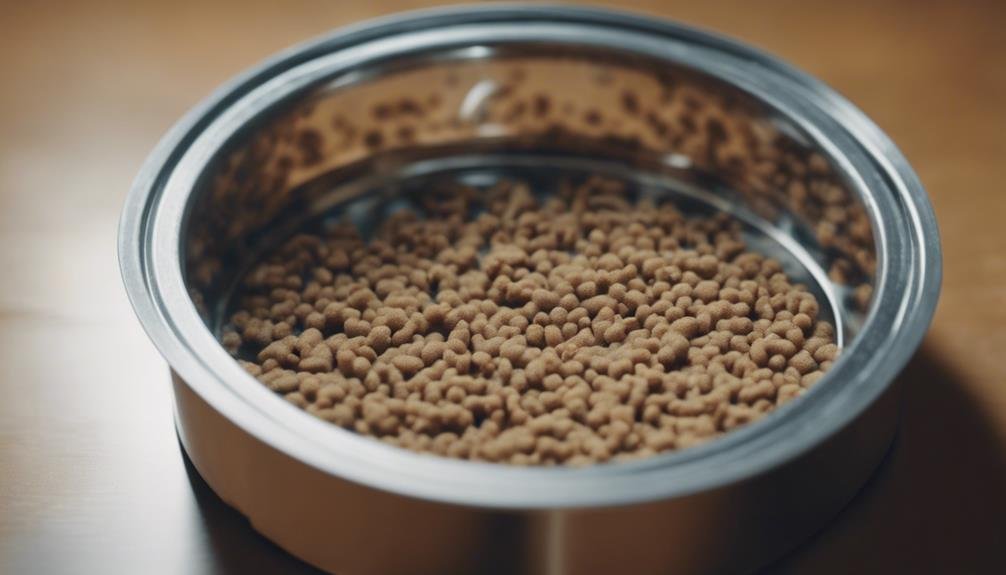
Research on microorganisms in dogs' food bowls highlights the importance of maintaining cleanliness to prevent the spread of harmful bacteria and ensure the well-being of both pets and humans. Understanding the findings of these studies is crucial for pet owners to take appropriate measures in maintaining a clean feeding environment.
- Certain bacteria can thrive in unwashed food bowls, posing health risks.
- Regular washing significantly reduces the presence of harmful microorganisms.
- Proper cleaning routines are essential to minimize the transmission of pathogens.
Risks: Salmonella and Listeria
The potential dangers of Salmonella and Listeria contamination in dogs' food bowls underscore the critical importance of maintaining a rigorous cleaning regimen. Salmonella and Listeria are harmful bacteria that can cause serious illnesses in both dogs and humans if ingested. Regular washing of food bowls with hot water and soap is essential to prevent the growth and spread of these pathogens. To emphasize the significance of proper cleaning, the table below outlines key risks associated with Salmonella and Listeria contamination in dogs' food bowls.
| Risk Factors | Salmonella Contamination | Listeria Contamination |
|---|---|---|
| Transmission | Direct contact with feces | Contaminated food |
| Symptoms | Diarrhea, fever, vomiting | Fever, muscle aches |
| Severity | Can be severe, especially in young, old, or immunocompromised dogs | Can be severe, especially in pregnant dogs |
Illnesses From Neglect
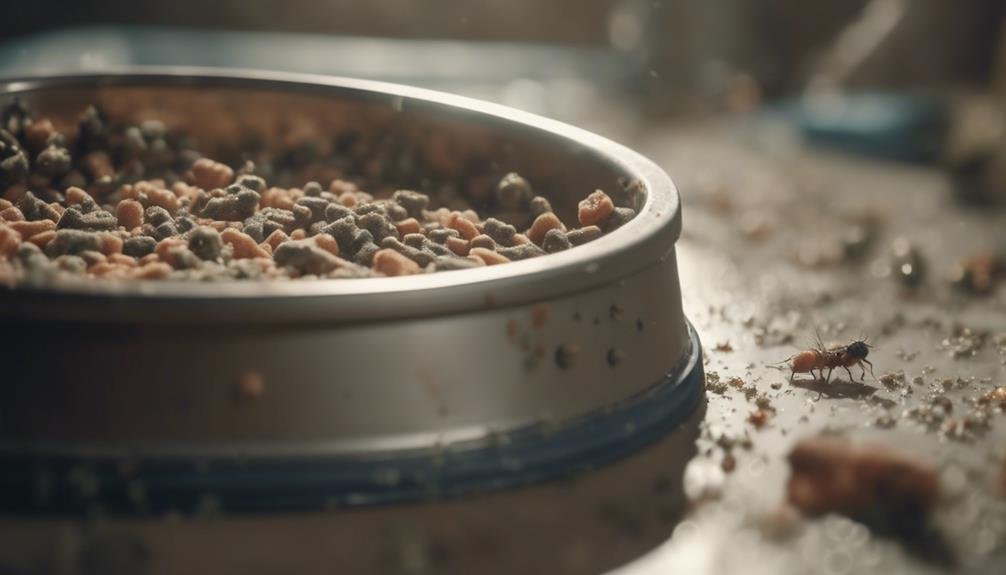
Neglecting to wash your dog's food bowls regularly can significantly increase the risk of illnesses for both your dog and yourself. Dirty bowls can harbor harmful bacteria that may lead to various health issues. Here are three key risks associated with neglecting to wash your dog's food bowls:
- Bacterial Infections: Unwashed bowls can be breeding grounds for bacteria like salmonella and listeria, which can cause severe illnesses in dogs and humans.
- Parasitic Infections: Neglected bowls can attract parasites like worms and giardia, leading to gastrointestinal problems and discomfort for your dog.
- Cross-Contamination: Residues left in unwashed bowls can contaminate fresh food, increasing the likelihood of foodborne illnesses for your pet.
Regular washing of your dog's food bowls is essential for maintaining a healthy environment and preventing potential illnesses.
Frequency for Dry Food Dogs
Maintaining a regular washing schedule for dry food dogs' bowls is crucial for ensuring their health and hygiene. For healthy dogs on a dry food diet, washing their food bowls a few times per week is recommended. This frequency helps prevent the buildup of harmful bacteria that can lead to illnesses for both pets and humans.
Following FDA guidelines for food storage and cleanliness is essential, along with using hot water and soap for thorough cleaning. Consistency in washing routines is key to maintaining a clean feeding environment for your furry companion. By incorporating regular bowl washing into your pet care routine, you can promote a healthier living environment and reduce the risk of potential infections.
Immunocompromised Dogs' Needs
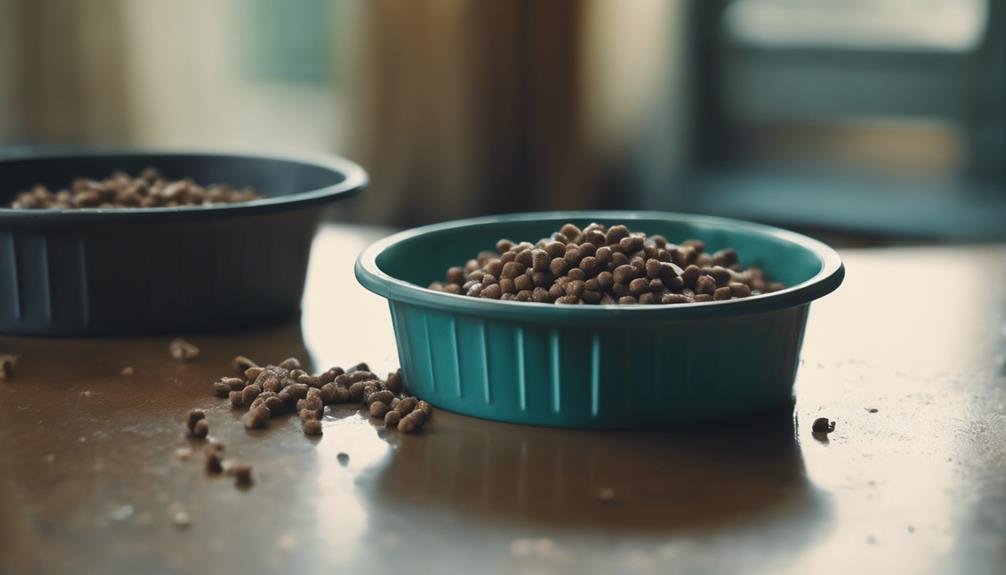
For immunocompromised dogs, meticulous cleaning of food bowls becomes imperative to safeguard their health. These dogs have a weakened immune system, making them more susceptible to infections from bacteria or pathogens that may linger in unwashed bowls.
To ensure the well-being of immunocompromised dogs, pet owners should follow these key practices:
- Wash food bowls after every meal: Given their compromised immune system, these dogs need their food bowls cleaned thoroughly after each feeding to minimize the risk of bacterial contamination.
- Use hot water and pet-safe soap: Proper cleaning with hot water and soap helps eliminate harmful bacteria effectively.
- Consider using a dishwasher on a high-temperature setting: Dishwashers can provide an extra layer of sanitation, especially for immunocompromised dogs who are more vulnerable to infections.
FDA Guidelines Compliance
Compliance with FDA guidelines is essential for ensuring the safety and quality of food and pet products for your dog. Following these guidelines helps in preventing contamination, ensuring proper storage, and maintaining hygiene standards.
The FDA provides regulations on ingredients, labeling, and production processes to safeguard the health of pets. Adhering to these guidelines can minimize the risk of foodborne illnesses and ensure that your dog's food is safe for consumption.
Thorough Cleaning Essentials
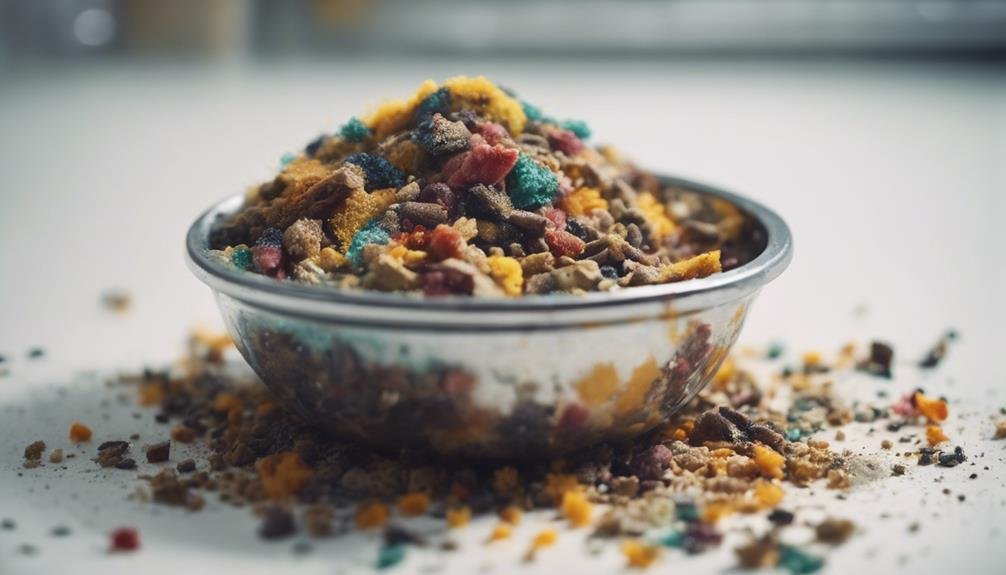
To ensure the cleanliness and safety of your dog's food bowls, thorough cleaning using hot water and soap is imperative, especially considering the importance of FDA guidelines compliance in maintaining hygiene standards for pet care. When it comes to maintaining your dog's food bowls, here are some essential cleaning tips to follow:
- Use Hot Water: Hot water helps to effectively remove food residue and kill bacteria that may be lingering in the bowl.
- Use Soap: Soap is essential for breaking down oils and fats that can accumulate in the bowl, ensuring a thorough clean.
- Scrub Thoroughly: Take the time to scrub the bowl thoroughly, making sure to reach all corners and crevices where bacteria can hide.
Consistent Routine Importance
Maintaining a consistent routine for washing your dog's food bowls is essential for ensuring the health and safety of both your pet and your household. By establishing a regular schedule for cleaning your dog's food bowls, you can significantly reduce the risk of harmful bacteria growth and potential illnesses.
Consistency in washing routines helps prevent the transmission of diseases such as salmonella and listeria, safeguarding not only your dog's well-being but also that of your family members. Regular washing with hot water and soap, following recommended guidelines, is crucial in maintaining hygiene standards.
Developing a habit of frequent bowl washing can effectively mitigate health risks associated with contaminated food bowls and contribute to a healthier living environment for everyone in the household.
Time Allocation for Cleaning
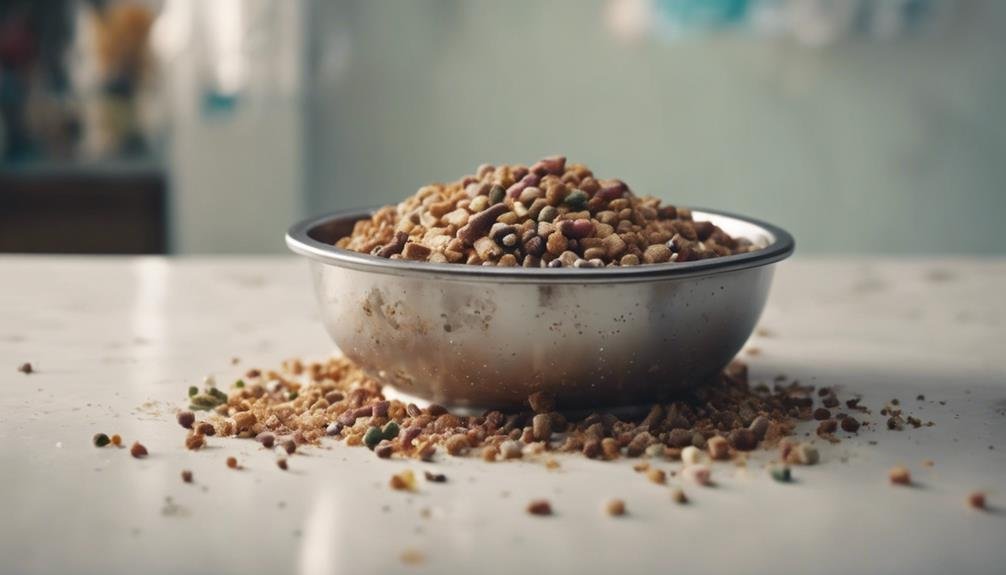
Developing a consistent schedule for cleaning your dog's food bowls is paramount in ensuring proper hygiene and preventing the spread of harmful bacteria. To effectively allocate time for cleaning, consider the following:
- Set Aside Specific Time: Designate a particular day or days each week for thorough cleaning to maintain a routine.
- Prioritize Bowl Cleaning: Ensure that cleaning your dog's food bowls is a priority to prevent the buildup of bacteria and contamination.
- Incorporate Cleaning into Daily Tasks: Integrate bowl cleaning into your daily chores to make it a regular habit and reduce the risk of forgetting.
Effective Soap and Hot Water
Ensuring proper cleanliness in your dog's food bowls involves utilizing effective soap and hot water. Hot water helps to loosen any food residue or bacteria present in the bowl, making it easier to scrub away. Soap is essential for breaking down oils and fats that may be stuck to the bowl's surface.
When choosing a soap, opt for a mild, pet-safe option to avoid any potential irritations for your dog. Thoroughly rinse the bowls after washing to remove any soap residue that could upset your dog's stomach.
The combination of hot water and soap is a simple yet powerful method to maintain a hygienic environment for your pet's feeding area.
Food Recall Awareness
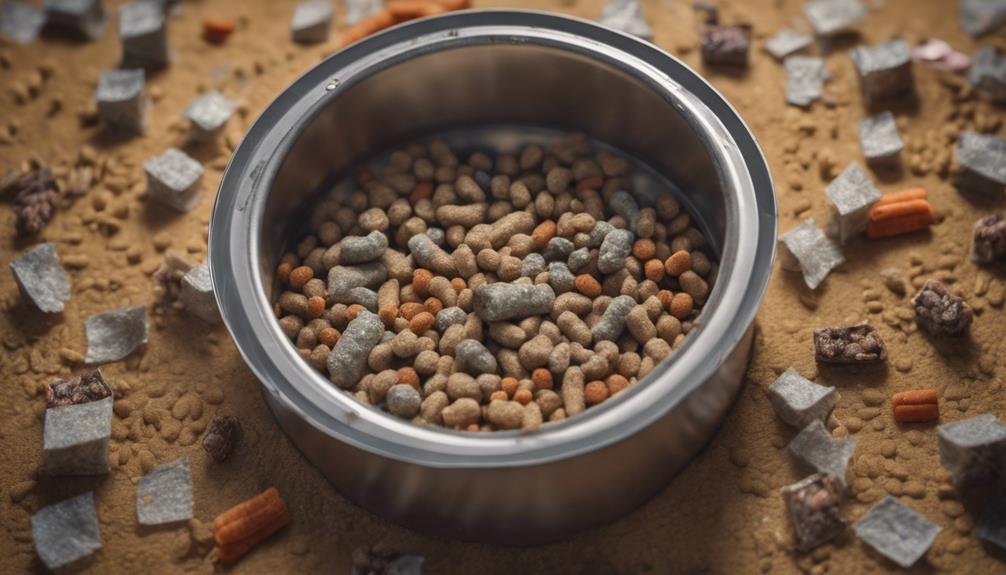
Staying informed about food recalls is crucial for ensuring the safety of your dog's meals. Being aware of potential risks and promptly addressing them can help prevent health issues in your furry friend.
To stay on top of food recall information, consider the following:
- Regularly check the FDA and other reliable sources for updates on pet food recalls.
- Keep an eye out for notifications from the pet food brands you use.
- Act swiftly if any of your dog's food products are affected by a recall, following the recommended steps to safeguard your pet's health.
Maximum Cleanliness Guidelines
For optimal hygiene in maintaining your dog's health, adhering to stringent cleaning practices for their food bowls is imperative. To ensure maximum cleanliness, it is recommended to allocate time every week or few days for thorough cleaning using hot water and soap.
Staying updated on food recalls can also contribute to the safety of your dog's food. Consider following stringent food-handling guidelines to minimize the risk of harmful bacteria or contaminants.
Regular washing of bowls is a simple yet effective way to prevent illnesses for both your dog and yourself. By consistently implementing these guidelines, you can create a safe and healthy feeding environment for your furry companion.
Illness Prevention Through Washing
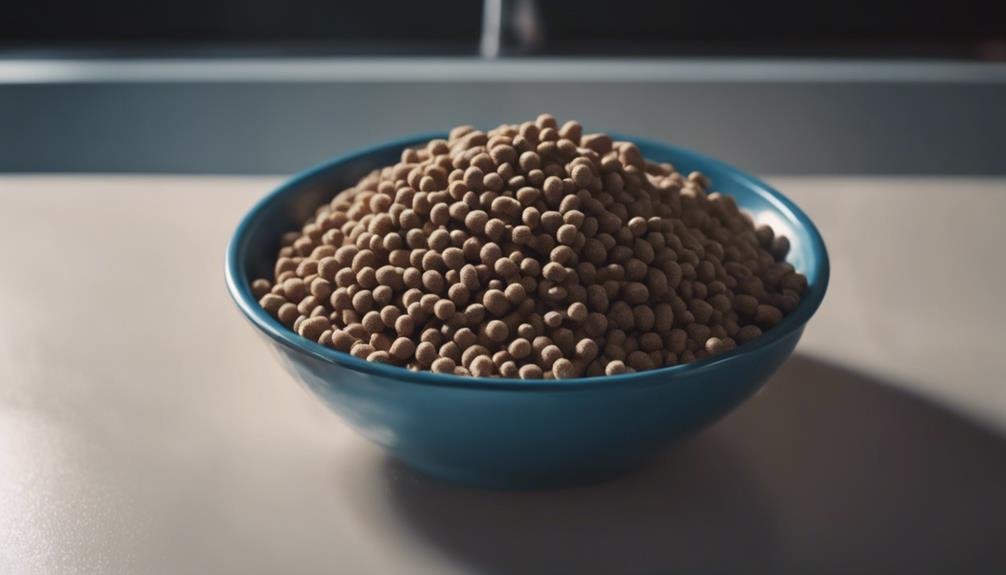
To uphold optimal cleanliness standards and safeguard against potential health risks, thorough washing of your dog's food bowls serves as a fundamental practice in preventing the spread of illnesses. It is essential to follow these key steps to ensure effective illness prevention through washing:
- Regular Cleaning: Wash the bowls after each meal to remove food residue and bacteria.
- Hot Water and Soap: Use hot water and soap to thoroughly clean and disinfect the bowls.
- Consistent Routine: Establish a consistent washing schedule to maintain hygiene and prevent the buildup of harmful pathogens.
Conclusion
In conclusion, maintaining cleanliness in dogs' food bowls is crucial for preventing the proliferation of harmful bacteria and safeguarding the health of pets and their human companions.
Neglecting to wash food bowls can lead to potential exposure to pathogens like Salmonella and Listeria, resulting in illnesses.
By adhering to consistent washing routines with effective soap and hot water, pet owners can significantly reduce the risks of contamination and create a safer environment for their canine companions.




